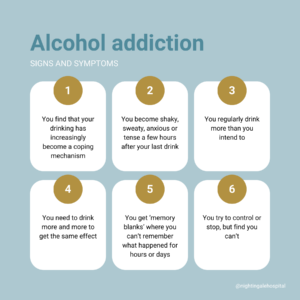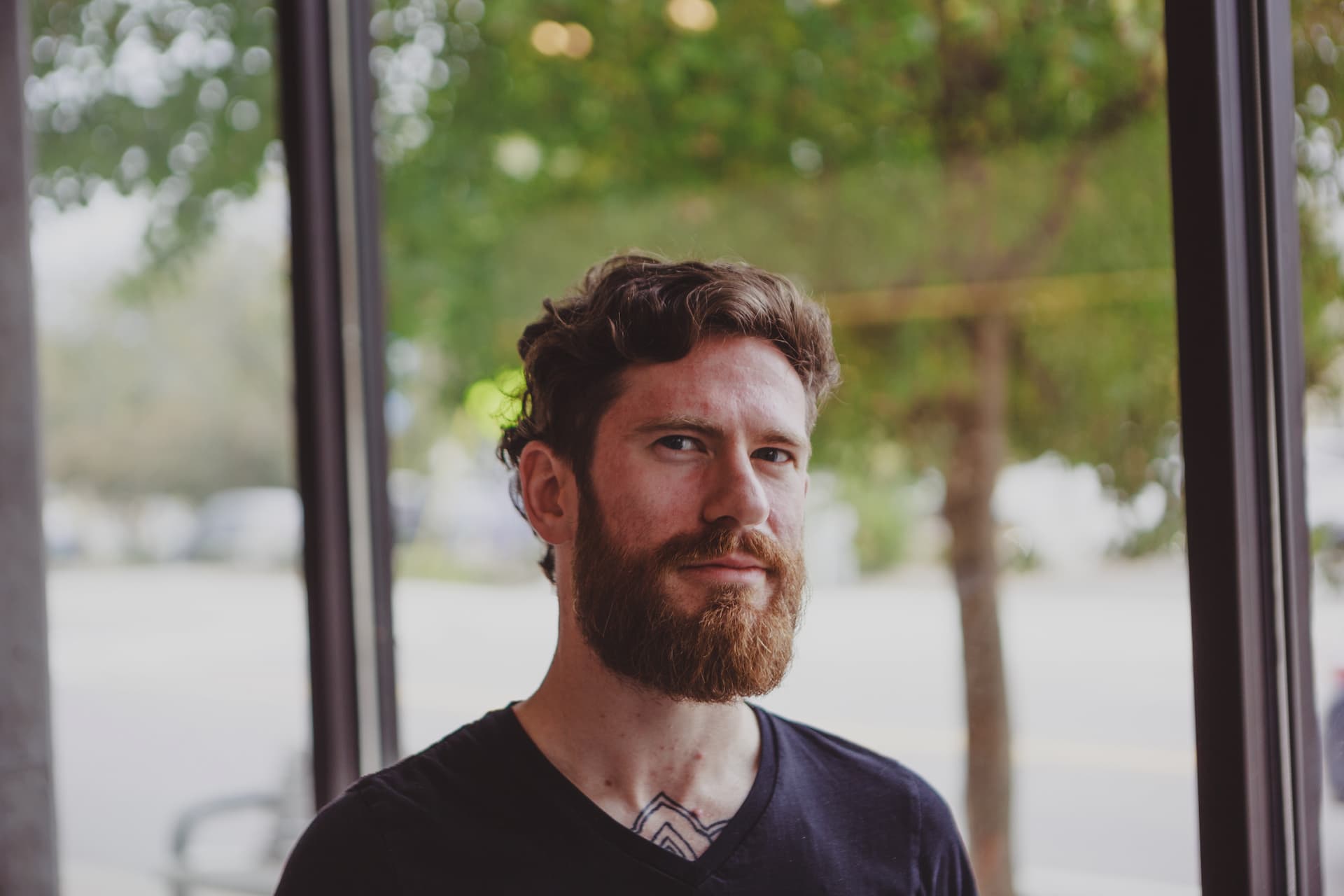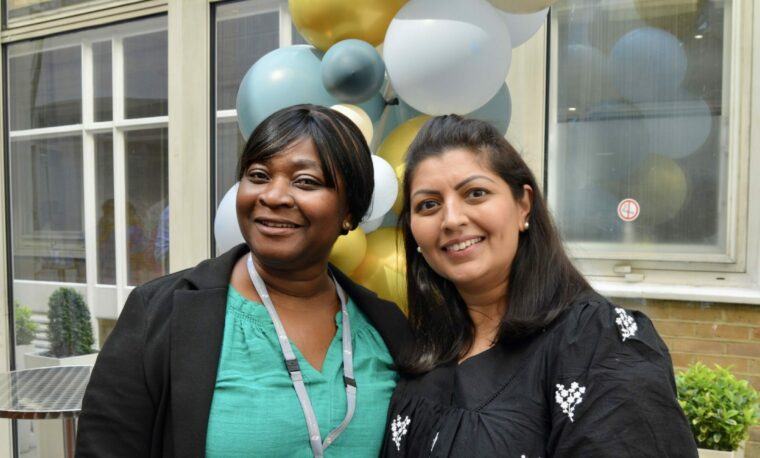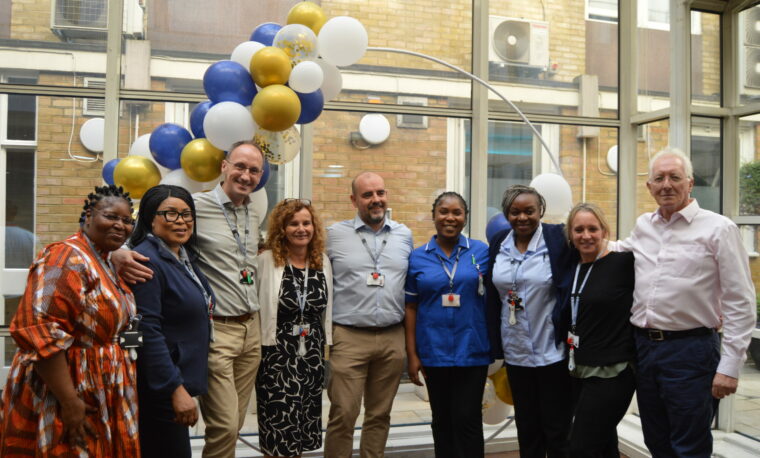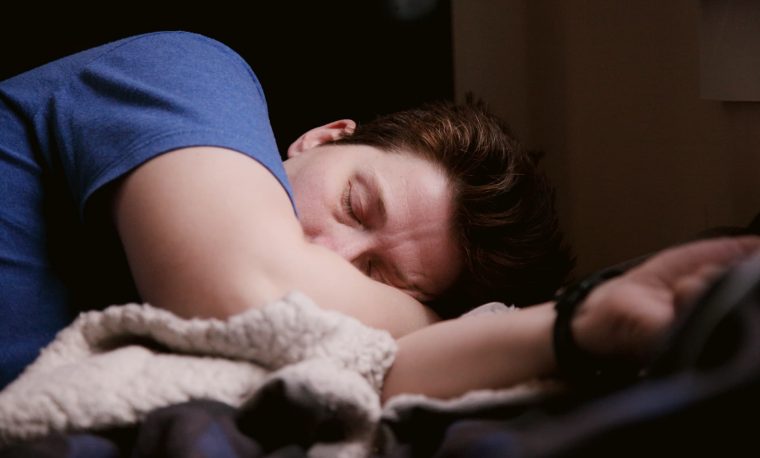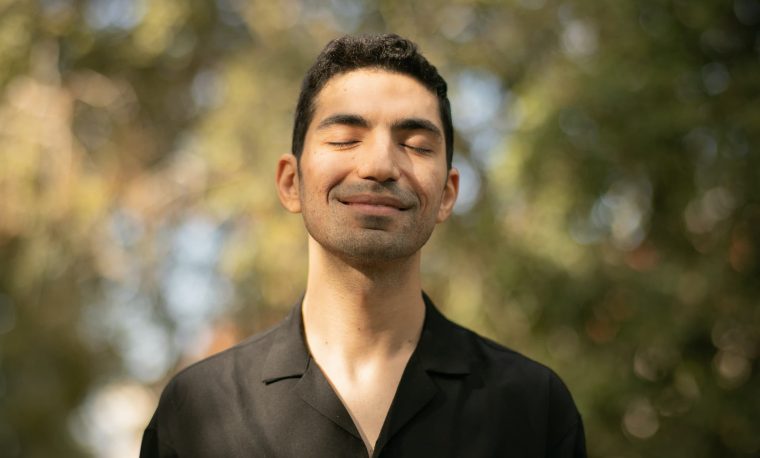Alcohol addiction: What it is, signs, effects and treatment
What is alcohol addiction?
For some, alcohol is an enjoyable part of many social occasions and celebrations. However, alcohol is an addictive substance, and overuse or reliance can result in alcohol addiction which is also known as ‘alcohol use disorder’ or ‘alcoholism’.
Problem drinking can arise for a number of reasons, including as a way of managing stress, anxiety or depression. It can also be triggered by life events, such as bereavement or loss of a job. However, most people do not realise that their reliance on alcohol can compound and exacerbate their issues. From this use, alcohol often results in damaging physical and psychological consequences. Alcohol use may in some situations turn into an alcohol dependency, which means you are not able to function in your day-to-day life without alcohol. However, recovery is possible, and treatment is available.
At Nightingale Hospital, we have a number of pathways for those struggling with alcohol addiction. Alcohol addiction will often not resolve itself without specialist support and we are here to provide help at each stage of recovery.
Signs and symptoms of an alcohol addiction
Some warning signs that you have an alcohol addiction are:
- You do not feel right without a drink or need a drink to start the day
- You get very shaky, sweaty, and anxious/tense a few hours after your last drink
- You regularly drink more than you intend to
- You need to drink more and more to get the same effect
- You try to stop, but you find you can’t
- You try to control or stop, but find you can’t
- You get ‘memory blanks’ where you can’t remember what happened for a period of hours or days
- You find that your drinking has increasingly become a coping mechanism to deal with outside triggers
How can alcohol addiction affect you?
Psychological effects of alcohol addiction include:
- Anxiety
- Depression
- Memory problems
- Impaired learning
- Suicidal thoughts and feelings
- Psychosis
Physical effects of alcohol addiction include:
- Shrinkage to the frontal lobes of your brain
- Blacking out
- Slurred speech
- Heart damage and cardiovascular disease
- Liver damage
- Pancreatitis
- Infertility
- Birth defects
- Cancer
- Lung infections
- Fatigue
- Thinning bones
- Sexual dysfunction
Free telephone consultation
We offer a free telephone consultation to determine if addiction treatment would be right for you, or a loved one. Complete the form below and an addiction specialist will be in touch to arrange a telephone appointment.
Addictions treatment telephone consultation
We offer a free telephone consultation to determine if addictions treatment would be right for you, or a loved one. Complete the form below and a member of our expert addictions team will be in touch to arrange an appointment.
Book your consultation
Treating alcohol addiction at Nightingale Hospital
Many people do recover from addiction with no professional treatment, and there is not only one path. However, the evidence is clear – professional treatment works and makes it more likely that people begin recovery and continue in recovery.
Alcohol addiction treatment at Nightingale Hospital is underpinned by an integrative approach combining motivational interviewing, cognitive behavioural therapy, interpersonal and experiential therapy alongside 12-step facilitation. At Nightingale, we want to provide a safe and supported environment in which someone can begin to heal and most importantly, hope again. We place a strong emphasis on relapse prevention, psychoeducation and group therapy with the implementation of positive coping strategies and family support in treatment. A key part of our comprehensive assessment is the identification of significant life traumas that may have contributed to developing or maintaining addictive behaviours. Our addiction treatment is based on a therapeutic framework of biopsychosocial care with the support of some of the UK’s leading addiction specialists. All our addiction treatment offerings are based on current clinical evidence and in line with the National Institute for Health and Care Excellence (NICE) guidelines.
All addiction treatment at Nightingale Hospital begins with a consultation with one of our addiction therapists or a consultant psychiatrist specialising in addiction.
This consultation is an opportunity for us to understand your history, and assess your current situation and needs. We can provide more information about our admission process and the addiction treatment programmes we offer. Following a consultation with an addictions therapist, you will then have an assessment with a consultation psychiatrist who will work with you to create a treatment plan and an individual treatment pathway. Each person experiencing addiction is unique, so treatment plans are tailored to your specific needs, circumstances, and history. You are not alone in this journey and we are here to help.
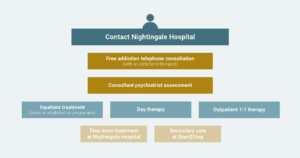
Depending on the outcome of this assessment, we offer two different intensive inpatient pathways, a 28-day addiction treatment rehabilitation programme or a 7-10-day detox programme. Our outpatient service includes a day patient programme or outpatient 1:1 therapy for treating addiction.
Free telephone consultation
We offer a free telephone consultation to determine if addiction treatment would be right for you, or a loved one. Complete the form below and an addiction specialist will be in touch to arrange a telephone appointment.
Addictions treatment telephone consultation
Alcohol addiction specialists at Nightingale Hospital
Nightingale Hospital London has a number of consultant psychiatrists and specialist therapists that can help you with alcohol addiction. It is vital you find a specialist that you can trust and work with on your recovery.
Our addiction treatment team is led by:
- Dr Anshul Swami – Lead Consultant for Addiction Services Consultant Psychiatrist at Nightingale Hospital
- Patrick Maxwell – Lead Therapist for Addictions, Nightingale Hospital
Frequently asked questions (FAQs)
- Addiction is a complex condition, characterised by an uncontrollable urge to use a particular substance (drugs or alcohol), or engage in a behaviour (gambling, technology, sex and love), despite many harmful consequences. When someone develops an addiction to a substance or a behaviour, use will overstimulate the reward pathways in the brain resulting in pleasure. Use of the substance and behaviour can be used as a coping mechanism to avoid unpleasant feelings, thoughts or emotions. Over time, the brain function of self-regulation is diminished and control becomes almost impossible, resulting in an addiction. An addiction can rapidly impact an individual’s mental and physical health, relationships, and finances and cause social and legal problems. Professional addiction treatment is shown to be the most effective way to tackle addiction and support the individual in long-term recovery.
- The length of time that substances stay within the body depends on several factors. These include the type of substance, amount and frequency of use, the presence of other substances in your body, as well as tolerance, metabolism, body mass and other genetic factors.
The below figures can be used as a general guide:
- Alcohol: 3-5 days in urine, 10-12 hours in blood
- Amphetamines: 1-3 days in urine and around 12 hours in blood
- Barbiturates: 2-4 days in urine and 1-2 days in blood
- Benzodiazepines: 3-6 weeks in urine and 2-3 days in blood
- Cannabis: 7-30 days in urine and up to 2 weeks in blood
- Cocaine: 3-4 days in urine and 1-2 days in blood
- Codeine: 1 day in urine and up to 12 hours in blood
- Heroin: 3-4 days in urine and up to 12 hours in blood
- Ketamine: Up to 14 days in urine and up to 3 days in blood
- LSD: 1-3 days in urine and up to 2-3 hours in blood
- MDMA (ecstasy): 3-4 days in urine and 1-2 days in blood
- Methamphetamine (crystal meth): 3-6 days in urine and 24 – 72 hours in blood
- Methadone: 3-4 days in urine and 24-36 hours in blood
- Morphine: 2-3 days in urine and 6-8 hours in blood
- The terms addiction and dependency are often used interchangeably, but they refer to different aspects of substance use. Addiction encompasses a broad pattern of compulsive behaviour, an inability to control substance use despite negative consequences and psychological dependence, while dependency refers specifically to the body's adaptation to a substance, leading to tolerance and withdrawal symptoms when the substance is discontinued or reduced.
- Alcohol dependency and addiction can run in families and individuals with a family history of alcohol addiction are at increased risk of developing the disorder themselves compared to those without such a history. However, genetics alone do not determine whether someone will develop addiction. Environmental factors, such as exposure to alcohol during childhood, peer influences, stress, trauma, and socio-cultural factors, also play significant roles in the development of addiction.
- Nightingale Hospital is expertly placed to manage co-occurring conditions. With four different inpatient pathways (general mental health, addictions, eating disorders and OCD), five day therapy streams (general mental health, addictions, eating disorders, DBT and OCD) and outpatient therapy with clinicians of all disciplines, our hospital benefits from being able to tailor treatment plans for each patient. Your consultant psychiatrist will provide the most appropriate pathways for you but this might involve firstly the 28-day addiction rehabilitation programme, stepping down into a mental health or DBT day therapy programme and then continuing outpatient treatment with a therapist. We understand that every patient is different, so we believe their treatment should also look different.
- Our 28-day therapeutic model for recovery is underpinned by an integrative approach that combines various therapy modalities and 12-step facilitation. Our addiction treatment is intentionally designed to identify and address significant traumas that have played a role in causing or maintaining addictive behaviours. Often addictive behaviours are used as a coping mechanism, and while this may have become a physical dependency over time, our therapy programme addresses the root cause of addictions.
In terms of therapy modalities, addiction treatment can include:
- Cognitive Behavioural Therapy (CBT)
- Motivational Enhancement Therapy (MET)
- Twelve-Step Facilitation (TSF)
- Recovery planning
- Interpersonal Therapy (IPT) covers relationships, anxiety and depression, and motivation and change
- Relapse prevention and education
- Life skills
- Anger management
- Equine therapy
- Relaxation and meditation
- Sleep therapy
- Drama therapy
- Art therapy
- Wellbeing programmes such as nutrition and physical therapies
- Addiction is often described as a family disease, as it affects not only the person with the problem but has an emotional and relational consequences for a family system. Research has shown that the involvement of families in the treatment process greatly increases the prospects of a person’s recovery and healing for concerned others. Nightingale Hospital holds a monthly family day for families and carers of those in treatment. This group is facilitated by a family therapist with expertise in addiction recovery. Those close to the addicted person can often blame themselves and go through a wide range of emotions from despair, depression, and guilt to anger and frustration. This can lead to them feeling exhausted and having difficulty coping, as well as feeling powerless in how to deal with the situation. Nightingale also facilitates a weekly evening family support group with a therapist present. We hope to give family members strength, hope and understanding so that they are more able to manage the situation at home. The aim of the family support group is to reduce isolation and ensure you do not have to go through this experience alone.
- Our hospital is located within a beautiful and historic English site, dating back to 1902. Each patient has their own room with a television and all rooms are equipped with an ensuite toilet and shower or bath. The hospital’s restaurant is open for breakfast, lunch and dinner daily. It offers an extensive daily menu. Vegetarian and vegan options are available, and any specific dietary or religious requirements can be catered for. Exercise is an integral part of overall health. Nightingale Hospital offers a gymnasium for patient use when an individual is not participating in group therapy programmes. A personal trainer employed by the hospital will offer patients an initial assessment, and then tailor an exercise programme for them based on their fitness level and goals. This is a free service. We have the convenience of an on-site pharmacy, located on the ground floor of the hospital. This is led by a team of pharmacists who specialise in mental health medication and who can offer expert advice. All patients can access this service.
Useful resources
Book a free telephone consultation for
Alcohol addiction
We offer a free telephone consultation to determine if addictions treatment would be right for you, or a loved one.
Book your free consultation

